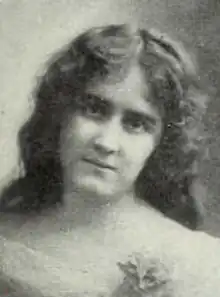Pauline Phelps
Pauline Phelps (November 13, 1870 – January 6, 1963) was an American writer and playwright, known for writing short monologues for recitation, and for her collaborations with partner Marion Short.[1]
Pauline Phelps | |
|---|---|
 Pauline Phelps, from a 1903 publication | |
| Born | November 13, 1870 |
| Died | January 6, 1963 (aged 92) |
| Other names | Pauline Short |
| Occupation | Writer |
Early life
Pauline Isabelle Phelps was born in Simsbury, Connecticut, the daughter of George Mortimer Phelps and Abigail Case Phelps.[2][3]
Career
Popular recitation pieces by Pauline Phelps included historical works such as Rosalind's Surrender (1901)[4] and As the Moon Rose, comic pieces with titles like Aunt Sarah on Bicycles and Telephone Romance (1899),[5] and the unusual Shakespearian Conference, in which a cast of Shakespeare's tragic characters gather to discuss the ways to increase the audience for Shakespeare plays. Phelps's plays were often performed by amateur community and school drama programs.[6] Her Daughters of the Revolution starred vaudevillian performer Neil Burgess as Hannah Thurber, in a 1903 production.[7]
Phelps often collaborated with her partner Marion Short on writing plays, sometimes using the joint pen-name Paul Marion.[8] Works by the duo included When a Woman Loves (1900), The Girl from Out Yonder (1906),[9] A Grand Army Man (co-authored with David Belasco and performed on Broadway in 1907, with David Warfield and Antoinette Perry in the cast),[10] As Molly Told It (1909), Jack's Brother's Sister (1916),[11] The Flour Girl (1920),[12] Shavings (1920, based on a novel by Joseph C. Lincoln),[13] The Belle of Philadelphia Town (1925), Cosy Corners (1922),[14] Stop! Go! (1930), The Wistful Widow (1932), and Sweet Clover.[15] They also adapted some works by English playwright Ina Leon Cassilis for American performance.[16][17]
Sweet Clover, one of the first of her collaborations with Marion Short to reach the stage, was called "by far the strongest play turned out yet by American female dramatists" by a critic from the Philadelphia Record.[1] Actress Adelaide Thurston starred in two early Phelps/Short plays in the 1900s, Sweet Clover and The Girl from Out Yonder.[1][9]
Late in her career, Phelps turned to adaptations. She adapted Louisa May Alcott's Little Women for performance in 1939,[18] and wrote a stage adaptation of Jane Eyre in 1941,[19] as well as stage adaptations of J. M. Barrie's The Little Minister (1940)[20] and Jane Austen's Pride and Prejudice (1941). After World War II several further short plays and adaptations by Phelps appeared, including Madame Butterfly (1954).[21]
Later life
Pauline Phelps traveled to North Dakota to marry Hugh Connoran Short and reside in rural Billings County. They were married in Dawson County Montana in 1942. Social security records list her death in the town of Medical Lake, Spokane County, Washington in January, 1963.
References
- "Two Women Dramatists" Minneapolis Journal (November 27, 1901): 5. via Newspapers.com

- "Miss Phelps' Reception" Meriden Morning Record (November 14, 1900): 4.
- John William Leonard, Woman's Who's Who of America (American Commonwealth Publishing Company 1914): 644.
- Pauline Phelps, Rosalind's Surrender (E. S. Werner 1901).
- Pauline Phelps, Telephone Romance (E. S. Werner 1899).
- "Junior Class Play" Dixon Evening Telegraph (October 30, 1937): 4. via Newspapers.com

- Advertisement, Fitchburg Sentinel (April 22, 1903): 6. via Newspapers.com

- Paul Marion, County Fair at Punkinville (E. S. Werner 1912).
- "'The Girl from Out Yonder': Adelaide Thurston's New Play" Emporia Gazette (January 16, 1907): 1. via Newspapers.com

- David Belasco presents David Warfield in A Grand Army Man, a New American Play by David Belasco, Pauline Phelps, and Marion Short (F. V. Strauss 1908).
- Pauline Phelps and Marion Short, Jack's Brother's Sister (Walter H. Baker & Co. 1916).
- Pauline Phelps and Marion Short, The Flour Girl (S. French 1927; copyright 1920 as "Hot Pancakes").
- "Shavings" Morning News (November 25, 1920): 6. via Newspapers.com

- Pauline Phelps and Marion Short, Cosy Corners: A Comedy in Four Acts (S. French 1922).
- Mrs. John A. Logan, The Part Taken by Women in American History (Perry-Nalle Publishing Company 1912): 792-3.
- Sherry Engle and Susan Croft, eds., Thousands of Noras: Short Plays by Women, 1875-1920 (iUniverse 2015): 432. ISBN 9781491768037
- Ina Leon Cassilis, Those Landladies: Boarding House Comedy for Two Females (E. S. Werner 1906), edited and revised by Pauline Phelps and Marion Short.
- Beverly Lyon Clark, The Afterlife of Little Women (JHU Press 2014): 118. ISBN 9781421415581
- Amnon Kabatchnik, Blood on the Stage, 1975-2000: Milestone Plays of Crime, Mystery, and Detection (Rowman & Littlefield 2012): 486. ISBN 9780810883543
- Pauline Phelps, The little minister, a play based upon J. M. Barrie's book of the same name, in three acts (Wetmore Declamation Bureau 1940).
- Pauline Phelps, Madame Butterfly (Wetmore Declamation Bureau 1954).
External links
- A photograph of Pauline Phelps in the Billy Rose Theatre Division, New York Public Library.